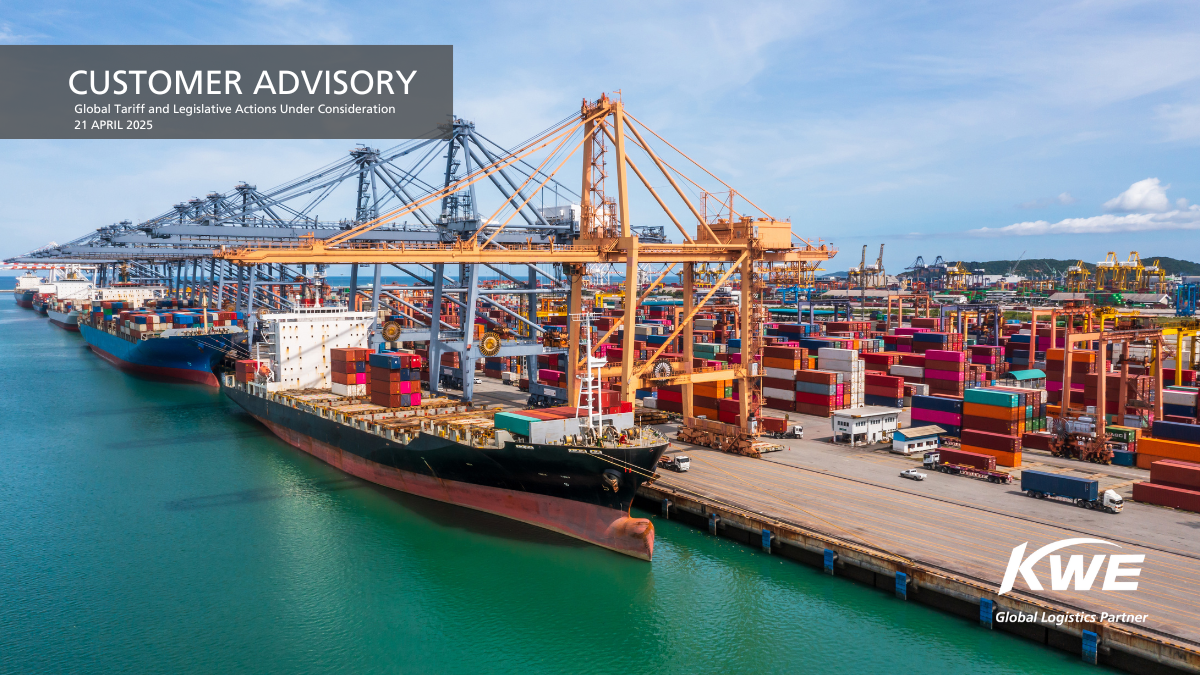Quote
Customer Advisory: Global Tariff and Legislative Actions Under Consideration

On April 9th, 2025, U.S. President Donald Trump announced a 90-day temporary suspension of additional tariffs for most countries. During a press conference in the U.S. Oval Office following a meeting with Italian Prime Minister Giorgia Meloni, Trump turned to Treasury Secretary Bessent to provide an overview of current tariff negotiations. "We’ve got a process in place. We’re working on the ‘Big 15’ economies first," Secretary Bessent likely referred to the world’s 15 largest economies by Gross Domestic Product (GDP), which include the United States, China, Japan, Germany, India, the United Kingdom, France, Italy, Brazil, Canada, Russia, South Korea, Australia, Spain, and Mexico. These countries are the most significant players in the global economy, accounting for the majority of international trade, investment, and GDP. Of the top 15, four are members of the EU. Here’s a breakdown of what we’ve learned so far:
AUSTRALIA: Most goods originating in Australia will be subject to the 10% tariff upon import into the U.S. The new tariffs will be paid by U.S. importers.
BRAZIL: President Trump’s policy shifts have forced Brazil to rethink its U.S. strategy. Negotiators report a lack of clear direction and inconsistent messaging from the White House amid ongoing trade talks.
CANADA: Some Canadian retailers have become more vocal about U.S. imports, going beyond just identifying products made in Canada to specifically targeting American-made products with a warning label 'T' for 'tariffs.
CHINA: China places export restrictions on rare earth elements as part of its sweeping response to U.S. President Trump’s tariffs. Rare earth elements are vital in electric vehicles, powerful magnets, advanced fighter jets, submarines, smartphones, television screens, and many other products. Despite their name, the 17 elements are not actually rare, but finding them in high enough concentrations to justify mining can be costly. Lin Jian, a spokesperson for the Chinese Foreign Ministry, told reporters last week: "Tariff and trade wars have no winner. China does not want to fight these wars, but is not afraid of them. We will not sit idly by when the Chinese people's legitimate rights and interests are denied. If the U.S. is determined to fight a tariff and trade war, China’s response will continue until the end."
EU: President Trump promises a trade deal with Europe, moving beyond speculation about an EU rift. Italy has set its sights on a "zero tariff" agreement.
INDIA: India offers tariff cuts on U.S. farm imports, including almonds, walnuts, cranberries, pistachios, and lentils, worth $23 billion.
JAPAN: President Trump touted "big progress" during negotiations with the visiting Japanese trade delegation.
MEXICO: Mexico had planned to announce retaliatory tariffs on March 9th, but did not follow through after Trump exempted Mexican goods covered by the United States-Mexico-Canada Agreement (USMCA). On March 9th, President Claudia Sheinbaum affirmed Mexico’s commitment to curb fentanyl trafficking and said she expects the U.S. to continue preventing arms trafficking into Mexican territory. If Mexico does choose to implement retaliatory tariffs—particularly after the exemption on USMCA goods expired on April 2nd—it is likely they will target U.S. products such as vegetables, fruits, beer, and spirits.
SINGAPORE: The Singapore Economic Resilience Taskforce was formed to deal with the effects of Trump tariffs. Singapore's Prime Minister gave a stunning speech in Parliament, explaining exactly how Trump tariffs impact the country.
SOUTH KOREA: South Korea’s Ministry of Economy and Finance told reporters on Thursday: "The U.S. Department of the Treasury proposed a meeting with Secretary Bessent on major trade-related issues in conjunction with Deputy Prime Minister Choi's visit next week."
READ:
- Report by the Council on Foreign Relations titled: Here’s How Countries Are Retaliating Against Trump’s Tariffs.
- The International Monetary Fund (IMF) opined that surging U.S. tariffs will weaken the global economy and push up inflation this year, according to projections to be released next week. IMF Managing Director Kristalina Georgieva said Thursday (April 17th, 2025) that the Trump administration’s sharp increases in duties have caused global uncertainty to spike. The import taxes will slow global growth, but are not expected to cause a worldwide recession. The details of the IMF’s outlook will be issued on April 22nd, 2025.
- PHARMA: EXIGER has been named in Fast Company’s 2024 List of Brands That Matter and publishes a white paper titled “A Bitter Pill: America’s Dangerous Dependence on China-Made Pharmaceuticals,” as well as “Benchmarking CSCO Perspectives on the Shifting Tariff and Trade Environment.”
- As reported in our April 15th, 2025 issue on Restoring America’s Maritime Dominance, the United States Trade Representative (USTR) has issued a Notice of Action and Proposed Action in Section 301 Investigation of China’s Targeting of the Maritime, Logistics, and Shipbuilding Sectors for Dominance. A Request for Comments on April 19th, 2025, invites responses to the proposed tariff actions, including written comments, rebuttal comments, and requests to appear via the USTR’s electronic portal by May 8th, 2025, for consideration in a hearing to be held on May 19th, 2025. The USTR expects to levy fees on vessel owners and operators in China after 180 days. These fees will increase annually on April 17th in subsequent years (2026, 2027, 2028). These actions are intended to reverse China’s dominance and signal a demand for U.S.-built ships.
Informational document brought to you by KWE-USA Corporate Compliance